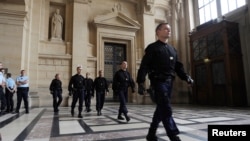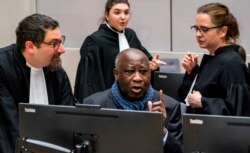A trial opened in Paris Monday over the 2004 bombing of a French military base in then war-torn Ivory Coast that killed an American soil scientist and nine French soldiers. The defendants are being tried in absentia. Nearly two decades later, the attack—and the French government’s response—raises many questions.
Two Ivorian soldiers and a mercenary from Belarus stand accused of the 2004 bombing of the French army base near Bouake—Ivory Coast’s second largest city held by rebels at a time, when the country was in the middle of a civil war. The whereabouts of the three men are unknown—one of the many mysteries surrounding this trial.
Relations between Ivory Coast and its former colonial power France were at a low point when the bombing took place. Anti-French sentiment — especially against its Licorne peacekeeping operation there — was high.
Paris was accused of aiding rebels fighting then-president, Laurent Gbagbo. France responded to the Bouake attack by destroying Ivory Coast’s tiny air force.
Some believe the attack was a blunder by Ivorian authorities. Former French ambassador to Ivory Coast, Jean-Marc Simon, told Radio France International he believed even former President Gbagbo had not been informed of it in advance - but suggested high-level members of Gbagbo's government must have given the orders.
Lawyer Lionel Bethune de Moro, representing some of the civil parties in the case, told Agence France-Presse news service he believes the attack was deliberate by Ivorian authorities — as a way to get France to leave Ivory Coast.
Still, others suggest the bombing was a plot by France to trigger Gbagbo’s departure. It’s a hypothesis raised by another lawyer of the victims, but dismissed by ambassador Simon as a conspiracy theory.
There are also questions about why the three defendants were never caught, and international arrest warrants against them not carried out. France’s former ministers of defense, interior and foreign affairs have been called as witnesses in this trial.
Bernadette Delon, sister of one of the victims, told AFP she doesn’t expect this trial to resolve anything.
It comes as the International Criminal Court in The Hague rules Wednesday on whether to uphold its earlier acquittal of Gbagbo on charges related to post-electoral violence in Ivory Coast, in 2010. If that happens, reports say, the former president plans to go home.
In Abidjan, Willy Neth, coordinator for the International Federation for Human Rights in Ivory Coast, says many Ivorians have turned the page on the traumatic events of 2004.
He expects few will closely follow this Paris trial. Still, Neth says, political opinions remain sharply divided on France.
They’re mostly negative when it comes to opposition figures supporting former president Gbagbo, while the current government of President Alassane Ouattara and his supporters consider France a key international partner.





